138 books about Classics and 5
start with B
138 books about Classics and 5
138 books about Classics
5 start with B start with B
5 start with B start with B
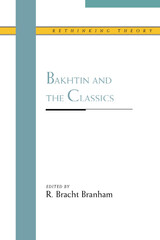
Bakhtin and the Classics
R. Bracht Branham
Northwestern University Press, 2001
Mikhail Bakhtin's critical and theoretical experiments have inspired original work in the humanities and social sciences, but Bakhtin and the Classics is the first book to focus on the relationship between Bakhtin and classical studies, the discipline in which Bakhtin himself was trained. Clearly demonstrating the fundamental importance of classical literature in his work, Bakhtin and the Classics expands our understanding of both Bakhtin's thought and the literary and cultural history of antiquity.
The authors, eminent classicists and distinguished critics of Bakhtin, put Bakhtin into dialogue with the classics--and classicists into dialogue with Bakhtin. Each essay offers a critical account of an important aspect of Bakhtin's thought and examines the value of his approach in the context of literary or cultural history. Beginning with an overview of Bakhtin's notion of carnival laughter, perhaps his central critical concept, the volume explores Bakhtin's thought and writing in relation to Homer's epic verse. Catullus's lyric poetry, ancient Roman novels, and Greek philosophy from Aristotle's theory of narrative to the work of Antiphon the Sophist. The results are of interest and importance to Bakhtinians, theorists, and classicists.
The authors, eminent classicists and distinguished critics of Bakhtin, put Bakhtin into dialogue with the classics--and classicists into dialogue with Bakhtin. Each essay offers a critical account of an important aspect of Bakhtin's thought and examines the value of his approach in the context of literary or cultural history. Beginning with an overview of Bakhtin's notion of carnival laughter, perhaps his central critical concept, the volume explores Bakhtin's thought and writing in relation to Homer's epic verse. Catullus's lyric poetry, ancient Roman novels, and Greek philosophy from Aristotle's theory of narrative to the work of Antiphon the Sophist. The results are of interest and importance to Bakhtinians, theorists, and classicists.
[more]
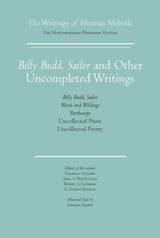
Billy Budd, Sailor and Other Uncompleted Writings
The Writings of Herman Melville, Volume 13
Herman Melville; Historical Note by Hershel Parker
Northwestern University Press, 2017
The gripping tale of a handsome and charismatic young sailor who runs afoul of his ship’s master-at-arms, is falsely accused of inciting a mutiny, and hung, Billy Budd, Sailor is often treated as a masterpiece, a canonical work. But that assessment is at least partly founded on the assumption that the story was complete and ready for publication when it was left among the manuscripts on Melville’s writing desk when he died in 1891. As Hershel Parker has pointed out, “It is a wonderfully teachable story—as long as it is not taught as a finished, complete, coherent, and totally interpretable work of art.” Furthering Melville’s goal of getting his last literary projects into print, even in their imperfect forms, this last volume in the edition presents the poetry and prose that Melville was unable to finish, his sometimes ineffectual, sometimes heroic purposes betrayed by death.
These unfinished writings include, besides Billy Budd, two projected volumes containing poems and prose pieces, Weeds and Wildings and Parthenope; three prose pieces, “Rammon,” “Story of Daniel Orme,” and “Under the Rose”; and some three dozen poems of varying lengths. Some of these pieces were surely composed late in Melville’s career, during his retirement, but others may date to as early as the 1850s. Except for Billy Budd, many of these works have not been readily available in reliable texts, when available at all.
This volume, the result of the editors’ meticulous study of the manuscripts, offers new reading texts, with significant corrections of words, phrases, and titles, the inclusion of heretofore unpublished lines of verse, and the return to their original locations of the two poems, “The Enviable Isles” and “Pausilippo,” that Melville had extracted for use in John Marr (1888) and Timoleon (1891). Hershel Parker’s Historical Note traces how these writings fit into the trajectory of Melville’s career, and the rest of the Editorial Appendix presents the scholarly evidence and decisions made in creating the reading texts. As a whole, the Northwestern-Newberry Edition of The Writings of Herman Melville, now complete in fifteen volumes, offers for the first time the total body of Melville’s extant writings in a critical text, faithful to his intentions.
These unfinished writings include, besides Billy Budd, two projected volumes containing poems and prose pieces, Weeds and Wildings and Parthenope; three prose pieces, “Rammon,” “Story of Daniel Orme,” and “Under the Rose”; and some three dozen poems of varying lengths. Some of these pieces were surely composed late in Melville’s career, during his retirement, but others may date to as early as the 1850s. Except for Billy Budd, many of these works have not been readily available in reliable texts, when available at all.
This volume, the result of the editors’ meticulous study of the manuscripts, offers new reading texts, with significant corrections of words, phrases, and titles, the inclusion of heretofore unpublished lines of verse, and the return to their original locations of the two poems, “The Enviable Isles” and “Pausilippo,” that Melville had extracted for use in John Marr (1888) and Timoleon (1891). Hershel Parker’s Historical Note traces how these writings fit into the trajectory of Melville’s career, and the rest of the Editorial Appendix presents the scholarly evidence and decisions made in creating the reading texts. As a whole, the Northwestern-Newberry Edition of The Writings of Herman Melville, now complete in fifteen volumes, offers for the first time the total body of Melville’s extant writings in a critical text, faithful to his intentions.
[more]
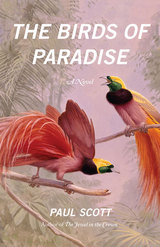
The Birds of Paradise
A Novel
Paul Scott
University of Chicago Press, 2013
Paul Scott is most famous for his much-beloved tetralogy The Raj Quartet, an epic that chronicles the end of the British rule in India with a cast of vividly and memorably drawn characters. Inspired by Scott’s own time spent in India during World War II, this powerful novel provides valuable insight into how foreign lands changed the British who worked and fought in them, hated and loved them.
A coming of age tale, The Birds of Paradise is the story of a boy and his childhood friendship with the daughter of a British diplomat and the son of the Raja. Scott artfully brings his young narrator’s voice to life with evocative language and an eye for detail, capturing the pangs of childhood and the bittersweet fog of memory with nostalgic yet immediate prose
[more]
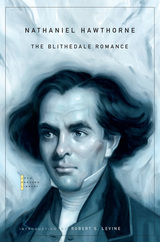
The Blithedale Romance
Nathaniel Hawthorne
Harvard University Press, 2010
One of Nathaniel Hawthorne’s great romances, The Blithedale Romance draws upon the author’s experiences at Brook Farm, the short-lived utopian community where Hawthorne spent much of 1841. Blithedale (“Happy Valley”), another would-be modern Arcadia, is the stage for Hawthorne’s grimly comic tragedy (Henry James famously called the novel “the lightest, the brightest, the liveliest” of Hawthorne’s “unhumorous fictions”). In his introduction, Robert S. Levine considers biographical and historical contexts and offers a fresh appreciation of the novel’s ironic first-person narrator.The John Harvard Library edition reproduces the authoritative text of The Blithedale Romance in The Centenary Edition of the Works of Nathaniel Hawthorne.
[more]
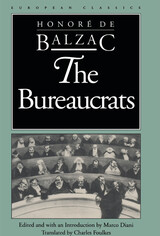
The Bureaucrats
Honore De Balzac
Northwestern University Press, 1993
The Bureaucrats (Les Employes) stands out in Balzac's immense Human Comedy by concentrating precisely and penetratingly on a distinctive "modern" institution: France's state bureaucracy. Rabourdin, aided by his unscrupulous wife, attempts to reorganize and streamline the entire system. Rabourdin's plan will halve the government's size while doubling its revenue. When the plan is leaked, Rabourdin's rival—an utter incompetent—gains the overwhelming support of the frightened and desperate body of low-ranking functionaries.
The novel contains the recognizable themes of Balzac's work: obsessive ambition, conspiracy and human pettiness, and a melodramatic struggle between the social good and the evils of folly and stupidity. It is also an unusual, dramatized analysis of a developing political institution and its role in shaping social class and mentality.
The novel contains the recognizable themes of Balzac's work: obsessive ambition, conspiracy and human pettiness, and a melodramatic struggle between the social good and the evils of folly and stupidity. It is also an unusual, dramatized analysis of a developing political institution and its role in shaping social class and mentality.
[more]
READERS
Browse our collection.
PUBLISHERS
See BiblioVault's publisher services.
STUDENT SERVICES
Files for college accessibility offices.
UChicago Accessibility Resources
home | accessibility | search | about | contact us
BiblioVault ® 2001 - 2024
The University of Chicago Press









